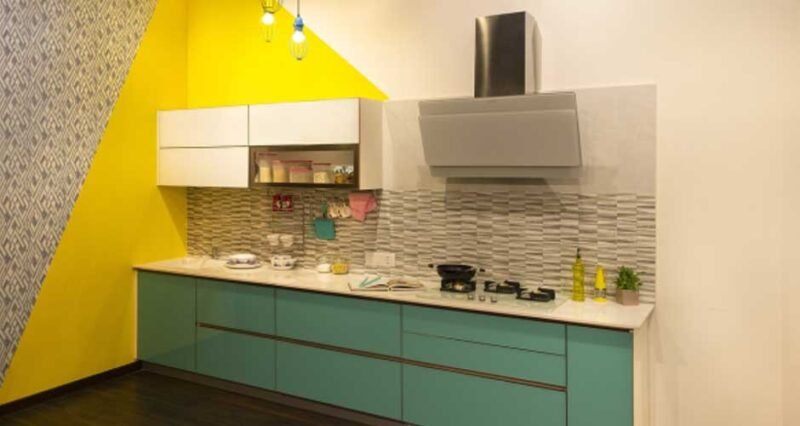
Are you tired of your traditional kitchen and looking for an upgrade? A modular kitchen can be the solution to all your problems. Modular kitchens have become increasingly popular in recent years notes KRS Holdings. They offer a sleek, modern design and unparalleled functionality and are available in various styles and configurations to suit your taste and budget. Here, we will explore the benefits of modular kitchens, design ideas, types of layouts, materials used, installation process, accessories and appliances, maintenance and cleaning tips, and the cost of a modular kitchen.
Benefits of Modular Kitchens
Modular kitchens offer several benefits over traditional kitchens. Their modular design is highly customizable, making adding or removing modules per your requirements easy. Modular kitchens also provide ample storage space and are designed to optimize the use of available space. They can be tailored to fit any kitchen size or shape, making them ideal for small and large spaces.
Another advantage of modular kitchens is their functionality. They are designed to make cooking and cleaning easier and more efficient. Modular kitchens come equipped with various accessories and appliances, such as pull-out drawers, cabinets, shelves, and baskets, making organizing your kitchenware and ingredients easy. They also come with various built-in appliances, such as stoves, ovens, and dishwashers, which can help you save time and effort when cooking and cleaning.
Modular kitchens also offer a high degree of customization. You can choose various materials, finishes, colors, and designs to match your taste and style. They can be designed to suit different cooking styles, such as Indian, Chinese, or Continental, and customized to fit your budget.
Modular Kitchen Design Ideas
Modular kitchens come in various traditional and modern designs and can be tailored to suit your taste and style. Here are some popular modular kitchen design ideas:
L-shaped Modular Kitchen
It is one of the most popular modular kitchen designs. In this layout, the kitchen is designed in an L-shape, with the countertop and cabinets along two adjacent walls. This design is ideal for small to medium-sized kitchens and provides ample counter space and storage.
U-shaped Modular Kitchen
In this layout, the kitchen is designed in a U-shape, with the countertop and cabinets along three walls. This design is ideal for larger kitchens and provides plenty of counter space and storage.
Parallel Modular Kitchen
The kitchen is designed in this layout with two parallel countertops and cabinets along two walls. This design is ideal for narrow kitchens and provides ample storage and counter space.
Island Modular Kitchen
This layout adds a central island to the kitchen, providing additional counter space and storage. This design is ideal for large kitchens and is perfect for entertaining guests.
Pros and Cons of Modular Kitchens
Modular kitchens offer several advantages, but they also have a few drawbacks. Here are some pros and cons of modular kitchens:
Pros
- Highly customizable
- Ample storage space
- Functional and efficient
- Available in a variety of styles and configurations
- It can be designed to optimize the use of available space
Cons
- Can be expensive
- Limited customization options for pre-designed modules
- It may require professional installation
- Some designs may not suit all cooking styles
Types of Modular Kitchen Layouts
Modular kitchens come in various layouts, each designed to suit different kitchen sizes and styles. Here are some popular types of modular kitchen layouts:
Straight Modular Kitchen
In this layout, the kitchen is designed in a straight line, with the countertop and cabinets along a single wall. This design is ideal for small kitchens and provides ample storage and counter space.
L-shaped Modular Kitchen
As mentioned earlier, in this layout, the kitchen is designed in an L-shape, with the countertop and cabinets along two adjacent walls. This design is ideal for small to medium-sized kitchens and provides ample counter space and storage.
U-shaped Modular Kitchen
In this layout, the kitchen is designed in a U-shape, with the countertop and cabinets along three walls. This design is ideal for larger kitchens and provides plenty of counter space and storage.
Parallel Modular Kitchen
As mentioned, the kitchen is designed with two parallel countertops and cabinets along two walls in this layout. This design is ideal for narrow kitchens and provides ample storage and counter space.
Materials Used in Modular Kitchens
Modular kitchens can be made using various materials, each with advantages and disadvantages. Here are some popular materials used in modular kitchens:
Plywood
Plywood is a popular material used for modular custom kitchen cabinets. It is durable, lightweight, and resistant to warping and cracking. Plywood cabinets are easy to customize and can be finished with various laminates and veneers.
MDF
Medium-density fiberboard (MDF) is a popular material for modular kitchen cabinets. It is affordable, easy to customize, and resistant to warping and cracking. MDF cabinets can be finished with a variety of laminates and paints.
Stainless Steel
Stainless steel is a popular material used for modular kitchen countertops and cabinets. This material is sturdy, simple to maintain and withstand stains and high temperatures. Stainless steel countertops and cabinets are highly customizable and can be finished with various textures and patterns.
Granite
Many people prefer to use granite for their kitchen countertops. This is because it is a sturdy material that can withstand heat and is easy to clean. Granite countertops are highly customizable and can be finished with various textures and patterns.
Installing a Modular Kitchen – What to Consider
Installing a modular kitchen requires careful planning and execution. Here are some things to consider when installing a modular kitchen:
Space
Before installing a modular kitchen, measuring the available space and planning the layout accordingly is important. The layout should optimize available space and provide ample storage and counter space.
Plumbing and Electrical Connections
Modular kitchens have various built-in appliances, such as stoves, ovens, and dishwashers, which require plumbing and electrical connections. It is important to ensure the plumbing and electrical connections are in place before installing the modular kitchen.
Professional Installation
Modular kitchens are designed to be installed by professionals. It is important to hire a professional installer with experience installing modular kitchens.
Modular Kitchen Accessories and Appliances
Modular kitchens come equipped with various accessories and appliances, such as pull-out drawers, cabinets, shelves, and baskets, making organizing your kitchenware and ingredients easy. They also come with various built-in appliances, such as stoves, ovens, and dishwashers, which can help you save time and effort when cooking and cleaning. Here are some popular modular kitchen accessories and appliances:
Pull-out Drawers
Pull-out drawers are a popular accessory in modular kitchens. They make it easy to access kitchenware and ingredients and are available in various sizes and configurations.
Cabinets
Cabinets are an essential accessory in modular kitchens. They provide ample storage space and are available in various sizes and configurations.
Shelves
Shelves are a popular accessory in modular kitchens. They provide additional storage space and are available in various sizes and configurations.
Baskets
Baskets are a popular accessory in modular kitchens. They make it easy to organize kitchenware and ingredients and are available in various sizes and configurations.
Maintenance and Cleaning Tips for Modular Kitchens
Modular kitchens require regular maintenance and cleaning to ensure their longevity and functionality. Here are some maintenance and cleaning tips for modular kitchens:
Regular Cleaning
Modular kitchens should be cleaned regularly to prevent the buildup of dirt and grime. Cabinets, countertops, and appliances should be wiped down with a damp cloth and mild detergent.
Avoid Harsh Chemicals
When cleaning modular kitchens, it’s best to steer clear of harsh chemicals like bleach and ammonia. They can damage the finishes and surfaces of cabinets, countertops, and appliances.
Avoid Scratches
Modular kitchen surfaces like countertops and cabinets should be protected from scratches. Cutting boards and mats should be used when preparing food, and heavy objects should be placed on the floor instead of on the countertops.
Cost of Modular Kitchen – Factors to Consider
A modular kitchen’s cost depends on several factors the kitchen’s size and layout, the materials used, the accessories and appliances included, and the installation cost. Here are some factors to consider when estimating the cost of a modular kitchen:
Kitchen Size
The size of the kitchen is a major factor in determining the cost of a modular kitchen. Larger kitchens require more materials and accessories, which can increase the cost.
Materials Used
The materials used in a modular kitchen can significantly affect the cost. High-end materials like stainless steel and granite can be more expensive than plywood and MDF.
Accessories and Appliances
The cost of a modular kitchen also depends on the accessories and appliances included. High-end accessories and appliances can significantly increase the cost.
Installation Cost
The installation cost of a modular kitchen depends on the installation’s complexity and the installer’s experience. It is important to hire a professional installer with experience installing modular kitchens.
Conclusion
Modular kitchens are a modern and functional solution for all your culinary needs. They offer several benefits over traditional kitchens, such as customization, ample storage space, and efficient functionality. You can find a modular kitchen with various styles and configurations to suit your taste and budget. However, it is important to consider the pros and cons, types of layouts, materials used, installation process, accessories and appliances, maintenance and cleaning tips, and the cost before deciding. With careful planning and execution, a modular kitchen can transform your cooking experience and add value to your home.

